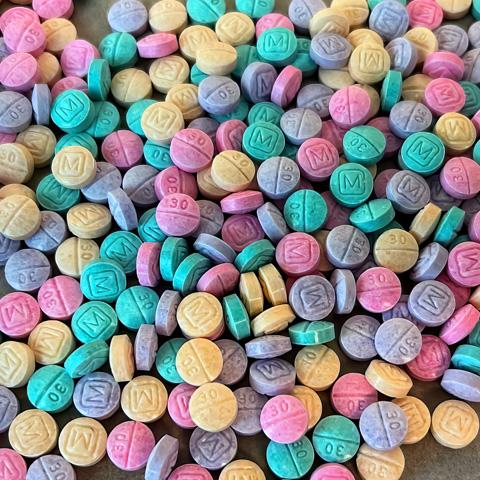Those dying from Fentanyl are not drug addicts, rather they are dying because they think they may be taking regular over the counter medication or simply eating candy. They are being poisoned. This White House has proven it does not care but the Drug Enforcement Agency DOES care.
Do you ever hear from the FBI that reports from the Southern border? How about U.S. Southern Command? How about Space Command? Yes, Space Command….
“We can use our space detection capabilities, optical cameras,” Croft told NBC 6. “We can track things within a couple of hours and see things moving.”
That includes being able to see what’s happening in places like Colombia and Venezuela, where intelligence experts fear drug traffickers and terrorist groups will join forces.
Around the clock, space and intelligence experts are sharing what they find.
Inside a room at Southern Command, there is a big screen that shows where the satellites are located. There is also a host of workstations where space experts can explain what they are seeing to representatives from the military and federal agencies.
“Space Command can provide a perspective to be able to identify and find some of these folks, the ways that they communicate, the ways they move,” said Lt. Col. Bobby Schmitt, who is with the U.S. Space Force and is assigned to coordinate what happens in orbit with Croft’s team. “Space Command provides the ability to see down and find these folks.” More here.
DEA Announces Results of Enforcement Surge to Reduce the Fentanyl Supply Across the United States
As part of the One Pill Can Kill initiative, the DEA and its law enforcement partners seized more than 10.2 million fentanyl pills and approximately 980 pounds of fentanyl powder during the period of May 23 through Sept. 8, 2022. The amount of fentanyl taken off the streets during this surge is equivalent to more than 36 million lethal doses removed from the illegal drug supply. Additionally, 338 weapons were seized, including rifles, shotguns, pistols, and hand grenades.
Every adult across the country should be talking about this and every school regardless of age should be taking all precautions.

As part of the One Pill Can Kill initiative, the DEA and its law enforcement partners seized more than 10.2 million fentanyl pills and approximately 980 pounds of fentanyl powder during the period of May 23 through Sept. 8, 2022. The amount of fentanyl taken off the streets during this surge is equivalent to more than 36 million lethal doses removed from the illegal drug supply. Additionally, 338 weapons were seized, including rifles, shotguns, pistols, and hand grenades.
Of the 390 cases investigated during this period, 51 cases are linked to overdose poisonings and 35 cases link directly to one or both of the primary Mexican cartels responsible for the majority of fentanyl in the United States – the Sinaloa Cartel and the Jalisco New Generation Cartel (CJNG). In addition, 129 investigations are linked to social media platforms, including Snapchat, Facebook Messenger, Instagram, and TikTok. These results build upon the One Pill Can Kill Phase II
results announced by DEA Administrator Anne Milgram in December 2021.
“Across the country, fentanyl is devastating families and communities, and we know that violent, criminal drug cartels bear responsibility for this crisis,” said Attorney General Merrick B. Garland. “The Justice Department, including the extraordinary professionals of the DEA, is working to disrupt and dismantle the operations of these cartels, remove deadly fentanyl from our communities, and save Americans’ lives.”
“For the past year, confronting the fentanyl crisis has been the top priority for DEA. The most urgent threat to our communities, our kids, and our families are the Sinaloa Cartel and CJNG who are mass producing and supplying the fentanyl that is poisoning and killing Americans,” said DEA Administrator Anne Milgram. “The Sinaloa Cartel and CJNG are ruthless, criminal organizations that use deception and treachery to drive addiction with complete disregard for human life. To save American lives, the DEA is relentlessly focused on defeating the Sinaloa Cartel and CJNG by degrading their operations to make it impossible for them to do business.”
Fentanyl remains the deadliest drug threat facing this nation. In 2021, a record number of Americans – 107,622 – died from a drug poisoning or overdose. Sixty-six percent of those deaths can be attributed to synthetic opioids such as fentanyl.
Drug traffickers have expanded their inventory to sell fentanyl in a variety of bright colors, shapes, and sizes
. Rainbow fentanyl was first reported to DEA in February 2022, and it has now been seized in 21 states.
Fentanyl is a synthetic opioid that is 50 times more potent than heroin. Just two milligrams of fentanyl, or the amount that could fit on the tip of a pencil, is considered a potentially lethal dose.
As part of DEA’s ongoing efforts to educate the public and encourage parents and caregivers to talk to teens and young adults about the dangers of fake pills and illicit drugs, DEA has also created a new resource, “What Every Parent and Caregiver Needs to Know About Fake Pills.”
In September 2021, DEA launched the One Pill Can Kill enforcement effort and public awareness campaign to combat the fake pill threat and educate the public about the dangers of fentanyl pills being disguised and sold as prescription medications, despite these pills not containing any of the actual medications advertised. The only safe medications are ones prescribed by a trusted medical professional and dispensed by a licensed pharmacist. All other pills are unsafe and potentially deadly.
Additional resources for parents and the community can be found on DEA’s Fentanyl Awareness page.

Pingback: One Pill Can Kill – Trevor Loudon's New Zeal Blog
Pingback: One Pill Can Kill | NoisyRoom.net